- Home
- Bill Bryson
The Life And Times Of The Thunderbolt Kid: A Memoir (v5.0) Page 24
The Life And Times Of The Thunderbolt Kid: A Memoir (v5.0) Read online
Page 24
So it was at that dark hour, fifty-nine minutes before their own alarm went off, that the peaceful night was rent by an enormous explosion in Doug and Joseph Willoughby’s bedroom. No one in Des Moines was out at that hour, of course, but anyone passing who chanced to glance up at the Willoughbys’ house at the moment of detonation would have seen first an intense yellow light upstairs, followed an instant later by the sight of two bedroom windows blowing spectacularly outward, followed a second after that by a large puff of smoke and a cheery flutter of confetti.
But of course the truly memorable feature of the event was the bang, which was almost unimaginably robust and startling. It knocked people out of bed up to fourteen blocks away. Automatic alarms sounded all over the city, and the ceiling sprinklers came on in at least two office buildings. A community air-raid siren was briefly activated, though whether by accident or as a precaution was never established. Within moments two hundred thousand groggy, bed-flung people were peering out their bedroom windows in the direction of one extremely well-lit, smoke-filled house on the west side of town through which Mr. Willoughby, confused, wild of hair, at the end of an extremely stretched tether, was stumbling, shouting: “What the fuck? What the fuck?”
Doug and his brother, though comically soot-blackened and unable to hear anything not shouted directly into their ears for the next forty-eight hours, were miraculously unharmed. The only casualty was a small laboratory rat that lived in a cage on the desktop and was now just a lot of disassociated fur. The blast knocked the Willoughby home a half an inch off its foundations and generated tens of thousands of dollars in repair bills. The police, fire department, sheriff’s office, and FBI all took a keen interest in prosecuting the family, though no one could ever quite agree on what charges to bring. Mr. Willoughby became involved in protracted litigation with his insurers and embarked on a long program of psychotherapy. In the end, the whole family was let off with a warning. Doug Willoughby and his brother were not allowed off the property except to go to school or attend confession for the next six months. Technically, they are still grounded.
And so we proceeded to high school.
Drinking became the preoccupation of these tall and festively pimpled years. All drinking was led by Katz, for whom alcohol was not so much a pastime as a kind of oxygen. It was a golden age for misbehavior. You could buy a six-pack of Old Milwaukee beer for 59 cents (69 cents if chilled) and a pack of cigarettes (Old Gold was the brand of choice for students of my high school, Roosevelt, for no logical or historic reason that I am aware of ) for 35 cents, and so have a full evening of pleasure for less than a dollar, even after taking into account sales tax. Unfortunately it was impossible to buy beer, and nearly as difficult to buy cigarettes, if you were a minor.
Katz solved this problem by becoming Des Moines’s most accomplished beer thief. His career of crime began in seventh grade when he hit on a scheme that was simplicity itself. Dahl’s, as part of its endless innovative efficiency, had coolers that opened from the back as well as the front so that they could be stocked from behind from the storeroom. Also inside the storeroom was a wooden pen filled with empty cardboard boxes waiting to be flattened and taken away for disposal. Katz’s trick was to approach a member of the staff by the stockroom door and say, “Excuse me, mister. My sister’s moving to a new apartment. Can I take some empty boxes?”
“Sure, kid,” the person would always say. “Help yourself.”
So Katz would go into the stockroom, select a big box, load it quickly with delicious frosty beer from the neighboring beer cooler, put a couple of other boxes on top as cover, and stroll out with a case of free beer. Often the same employee would hold the door open for him. The hardest part, Katz once told me, was acting as if the boxes were empty and didn’t weigh anything at all.
Of course you could ask for boxes on only so many occasions without raising suspicion, but fortunately there were Dahl’s stores all over Des Moines with the same help-yourself coolers, so it was just a matter of moving around from store to store. Katz got away with it for over two years and would be getting away with it still, I daresay, except that the bottom gave way on a box once at the Dahl’s in Beaver-dale as he was egressing the building, and sixteen quart bottles of Falstaff smashed onto the floor in a foamy mess. Katz was not built for running, and so he just stood grinning until a member of the staff strolled over and took him unresisting to the manager’s office. He spent two weeks at Meyer Hall, the local juvenile detention center, for that.
I had nothing to do with store thefts. I was far too cowardly and prudent to so conspicuously break the law. My contribution was to make, by hand, forged driver’s licenses. These were, if I say it myself, small masterpieces—albeit bearing in mind that state driver’s licenses were not terribly sophisticated in those days. They were really just pieces of heavy blue paper, the size of a credit card, with a kind of wavy watermark. My stroke of brilliance was to realize that the back of my father’s checks had almost exactly the same wavy pattern. If you cut one of his checks to the right size, turned it over, and, with the aid of a T square, covered the blank side with appropriate-sized boxes for the bearer’s name and address and so on, then carefully inked the words “Iowa Department of Motor Vehicles” across the top with a fine pen and a straight edge, and produced a few other small flourishes, you had a pretty serviceable fake driver’s license.
If you then put the thing through an upright office typewriter such as my father’s, entering false details in the little boxes, and in particular giving the bearer a suitably early date of birth, you had a product that could be taken to any small grocery store in town and used to acquire limitless quantities of beer.
What I didn’t think of until much too late was that the obverse side of these homemade licenses sometimes bore selected details of my father’s account—bank name, account number, telltale computer coding, and so on—depending on which part of the check I had cut to size with scissors.
The first time this occurred to me was about 9:30 on a weekday morning when I was summoned to the office of the Roosevelt principal. I had never visited the principal’s office before. Katz was there already, in the outer waiting room. He was often there.
“What’s up?” I said.
But before he could speak I was called into the inner sanctum. The principal was sitting with a plainclothes detective who introduced himself as Sergeant Rotisserie or something like that. He had the last flattop in America.
“We’ve uncovered a ring of counterfeit driver’s licenses,” the sergeant told me gravely and held up one of my creations.
“A ring?” I said and tried not to beam. My very first foray into crime and already I was, single-handedly, a “ring.” I couldn’t have been more proud. On the other hand, I didn’t particularly want to be sent to the state reform school at Clarinda and spend the next three years having involuntary soapy sex in the showers with guys named Billy Bob and Cletus Leroy.
He passed the license to me to examine. It was one I had done for Katz (or “Mr. B. Bopp,” as he had rather rakishly restyled himself). He had been picked up while having a beer-induced nap on the grassy median of Polk Boulevard the night before and a search of his personal effects at the station house had turned up the artificial license, which I examined with polite interest now. On the back it said “Bankers Trust” and beneath that was my father’s name and address—something of a giveaway to be sure.
“That’s your father, isn’t it?” said the detective.
“Why, yes it is,” I answered and gave what I hoped was a very nice frown of mystification.
“Like to tell me how that happened?”
“I can’t imagine,” I said, looking earnest, and then added: “Oh, wait. I bet I know. I had some friends over last week to listen to records, you know, and some fellows we’d never seen before crashed in on us, even though it wasn’t even a party.” I lowered my voice slightly. “They’d been drinking.”
The detective nodded grimly, knowledgea
bly. He’d been to this slippery slope before.
“We asked them to leave, of course, and eventually they did when they realized we didn’t have any beer or other intoxicants, but I just bet you while we weren’t looking one of them went through my dad’s desk and stole some checks.”
“Any idea who they were?”
“I’m pretty sure they were from North High. One of them looked like Richard Speck.”
The detective nodded. “It starts to make sense, doesn’t it? Do you have any witnesses?”
“Oom,” I said, a touch noncommittally, but nodded as if it might be many.
“Was Stephen Katz present?”
“I think so. Yes, I believe he was.”
“Would you go out and wait in the outer room and tell Mr. Katz to come in?”
I went out and Katz was sitting there. I leaned over to him and said quickly: “North High. Crashed party. Stole checks. Richard Speck.”
He nodded, instantly understanding. This is one of the reasons why I say Stephen Katz is the finest human being in the world. Ten minutes later I was called back in.
“Mr. Katz here has corroborated your story. It appears these boys from North High stole the checks and ran them through a printing press. Mr. Katz here was one of their customers.”
He looked at Katz without much sympathy.
“Great! Case solved!” I said brightly. “So, can we go?”
“You can go,” said the sergeant. “I’m afraid Mr. Katz will be coming downtown with me.”
So Katz took the rap, allowing me to keep a clean sheet, God bless him and keep him. He spent a month in juvenile detention.
THE THING ABOUT KATZ was that he didn’t do bad things with alcohol because he wanted to, he did them because he needed to. Casting around for a new source of supply, he set his sights higher. Des Moines had four beer distribution companies, all in brick depots in a quiet quarter at the edge of downtown where the railroad tracks ran through. Katz watched these depots closely for a couple of weeks and realized that they had practically no security and never worked on Saturdays or Sundays. He also noticed that railroad boxcars often stood on sidings beside the depots, particularly at weekends.
So one Sunday morning Katz and a kid named Jake Bekins drove downtown, parked beside a boxcar, and knocked off its padlock with a sledgehammer. They slid open the boxcar door and discovered that it was filled solid with cases of beer. Wordlessly they filled Bekins’s car with boxes of beer, shut the boxcar door, and drove to the house of a third party, Art Froelich, whose parents were known to be out of town at a funeral. There, with Froelich’s help, they carried the beer down to the basement. Then the three of them went back to the boxcar and repeated the process. They spent the whole of Sunday transferring beer from the boxcar to Froelich’s basement until they had emptied the one and filled the other.
Froelich’s parents were due home on Tuesday, so on Monday Katz and Bekins got twenty-five friends to put up five dollars each and they rented a furnished apartment in an easygoing area of town known as Dogtown near Drake University. Then they transferred all the beer by car from Froelich’s basement to the new apartment. There Katz and Bekins drank seven evenings a week and the rest of us dropped in for a Schlitz cocktail after school and for more prolonged sessions at weekends.
Three months later all the beer was gone and Katz and a small corps of henchmen returned downtown and spent another Sunday emptying out another boxcar from another distributor. When, three months after that, they ran out of beer again, they ventured downtown once more, but more cautiously this time because they were certain that after two big robberies somebody would be keeping a closer watch on the beer warehouses.
Remarkably, this seemed not to be so. This time there were no boxcars, so they knocked a panel out of one of the warehouse delivery bay doors, and slipped through the hole. Inside was more beer than they had ever seen at once—stacks and stacks of it standing on pallets and ready to be delivered to bars and stores all over central Iowa on Monday.
Working nonstop, and drafting in many willing assistants, they spent the weekend loading cars one after another with beer and slowly emptying the warehouse. Froelich expertly worked a forklift and Katz directed traffic. For a whole miraculous weekend, a couple of dozen high-school kids could be seen—if anyone had bothered to look—moving loads of beer out of the warehouse, driving it across town, and carrying it in relays into a slightly sagging and decrepit apartment house on Twenty-third Street and Forest Avenue. As word got around, other kids from other high schools began turning up, asking if they could take a couple of cases.
“Sure,” Katz said generously. “There’s plenty for all. Just pull your car up over there and try not to leave any fingerprints.”
It was the biggest heist in Des Moines in years, possibly ever. Unfortunately so many people became involved that everyone in town under the age of twenty knew who was responsible for it. No one knows who tipped off the police, but they arrested twelve principal conspirators in a dawn raid three days after the theft and took them all downtown in handcuffs for questioning. Katz was of course among them.
These were good kids from good homes. Their parents were mortified that their offspring could be so willfully unlawful. They called in expensive lawyers, who swiftly cut deals with the prosecutor to drop charges if they named names. Only Katz’s parents wouldn’t come to an arrangement. They couldn’t comfortably afford to and anyway they didn’t believe it was right. Besides, somebody had to take the rap—you can’t just let every guilty person go or what kind of criminal justice system would you have, for goodness’ sake?—so it was necessary to elect a fall guy and everyone agreed that Katz should be that person. He was charged with grand theft, a felony, and sent to reform school for two years. It was the last we saw of him till college.
I got through high school by the skin of my teeth. It was my slightly proud boast that I led the school in absences all three years and in my junior year achieved the distinction of missing more days than a boy with a fatal illness, as Mrs. Smolting, my careers counselor, never tired of reminding me. Mrs. Smolting hated me with a loathing that was slightly beyond bottomless.
“Well, frankly, William,” she said with a look of undisguised disdain one day after we had worked our way through a long list of possible careers, including vacuum cleaner repair and selling things door to door, and established to her absolute satisfaction that I lacked the moral fiber, academic credentials, intellectual rigor, and basic grooming skills for any of them, “it doesn’t appear that you are qualified to do much of anything.”
“I guess I’ll have to be a high-school careers counselor then!” I quipped lightly, but I’m afraid Mrs. Smolting did not take it well. She marched me to the principal’s office—my second visit in a season!—and lodged a formal complaint.
I had to write a letter of abject apology, expressing respect for Mrs. Smolting and her skilled and caring profession, before they would allow me to continue to my senior year, which was a serious business indeed because at this time, 1968, the only thing that stood between one’s soft tissue and a Vietcong bullet was the American education system and its automatic deferment from the draft. A quarter of young American males were in the armed forces in 1968. Nearly all the rest were in school, in prison, or were George W. Bush. For most people, school was the only realistic option for avoiding military service.
In one of his last official acts, but also one of his most acclaimed ones, the Thunderbolt Kid turned Mrs. Smolting into a small hard carbonized lump of a type known to people in the coal-burning industry as a clinker. Then he handed in a letter of carefully phrased apology, engaged in a few months of light buckling down, and graduated, unshowily, near the bottom of his class.
The following autumn he enrolled at Drake, the local university. But after a year or so of desultory performance there, he went to Europe, settled in England, and was scarcely ever heard from again.
Chapter 14
FAREWELL
In
Milwaukee, uninjured when his auto swerved off the highway, Eugene Cromwell stepped out to survey the damage and fell into a 50-foot limestone quarry. He suffered a broken arm.
—Time magazine, April 23, 1956
FROM TIME TO TIME when I was growing up, my father would call us into the living room to ask how we felt about moving to St. Louis or San Francisco or some other big-league city. The Chronicle or Examiner or Post-Dispatch, he would inform us somberly, had just lost its baseball writer—he always made it sound as if the person had not returned from a mission, like a Second World War airman—and the position was being offered to him.
“Money’s pretty good, too,” he would say with a look of frank consternation, as if surprised that one could be paid for routinely attending Major League baseball games.
I was always for it. When I was small, I was taken with the idea of having a dad working in a field where people evidently went missing from time to time. Then later it was more a desire to pass what remained of my youth in a place—any place at all—where daily hog prices were not regarded as breaking news and corn yields were never mentioned.
But it never happened. In the end he and my mother always decided that they were content in Des Moines. They had good jobs at the Register and a better house than we could afford in a big city like San Francisco. Our friends were there. We were settled. Des Moines felt like, Des Moines was, home.
Now that I am older I am glad we didn’t leave. I have a lifelong attachment to the place myself, after all. Every bit of formal education I have ever had, every formative experience, every inch of vertical growth on my body took place within this wholesome, friendly, nurturing community.

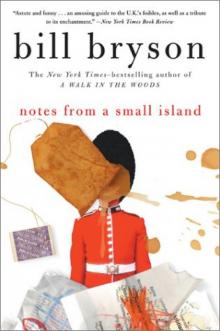 Notes from a Small Island
Notes from a Small Island A Short History of Nearly Everything
A Short History of Nearly Everything A Walk in the Woods
A Walk in the Woods I'm a Stranger Here Myself
I'm a Stranger Here Myself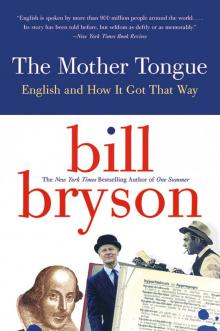 The Mother Tongue
The Mother Tongue Shakespeare
Shakespeare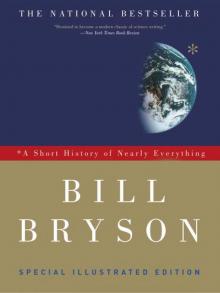 A Short History of Nearly Everything: Special Illustrated Edition
A Short History of Nearly Everything: Special Illustrated Edition The Best American Travel Writing 2016
The Best American Travel Writing 2016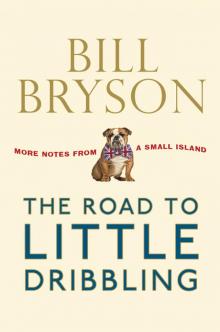 The Road to Little Dribbling
The Road to Little Dribbling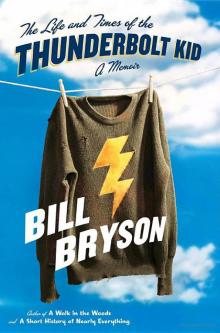 The Life And Times Of The Thunderbolt Kid: A Memoir (v5.0)
The Life And Times Of The Thunderbolt Kid: A Memoir (v5.0) Made In America
Made In America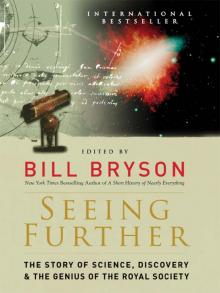 Seeing Further
Seeing Further Shakespeare: The World as Stage
Shakespeare: The World as Stage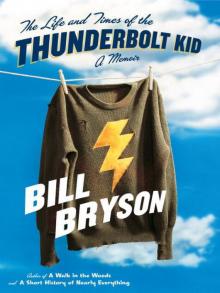 The Life and Times of the Thunderbolt Kid
The Life and Times of the Thunderbolt Kid At Home
At Home Bryson's Dictionary For Writers And Editors (v5.0)
Bryson's Dictionary For Writers And Editors (v5.0) Neither Here Nor There
Neither Here Nor There Bill Bryson's African Diary
Bill Bryson's African Diary